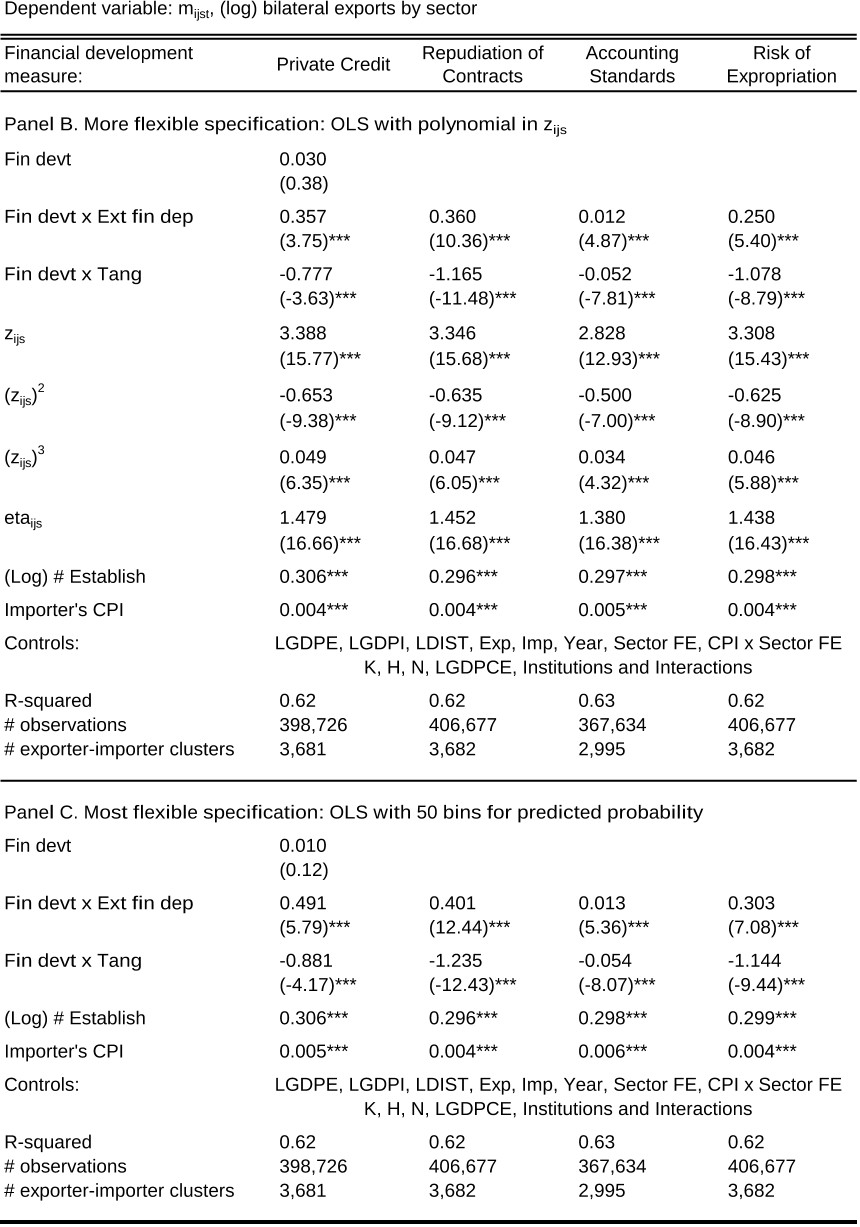Credit Constraints, Heterogeneous Firms and International Trade
Reads0
Chats0
TLDR
This article examined the detrimental consequences of financial market imperfections for international trade and developed a heterogeneous-firm model with countries at different levels of financial development and sectors of varying financial vulnerability.Abstract:
This paper examines the detrimental consequences of financial market imperfections for international trade. I develop a heterogeneous-firm model with countries at different levels of financial development and sectors of varying financial vulnerability. Applying this model to aggregate trade data, I study the mechanisms through which credit constraints operate. First, financial development increases countries' exports above and beyond its impact on overall production. Firm selection into exporting accounts for a third of the trade-specific effect, while two thirds are due to reductions in firm-level exports. Second, financially advanced economies export a wider range of products and their exports experience less product turnover. Finally, while all countries service large destinations, exporters with superior financial institutions have more trading partners and also enter smaller markets. All of these effects are magnified in financially vulnerable sectors. These results have important policy implications for less developed economies that rely on exports for economic growth but suffer from poor financial contractibility.read more
Figures

Table 10. Economic Significance: Predicted vs. Actual Trade Growth 
Table 9. Economic Significance: Comparative Statics 
Table 5. Financial Development and Firm-Level Exports 
Figure 3. The Productivity Cut-off for Exporting 
Table 5. Financial Development and Firm-Level Exports 
Table 1. Export Patterns in the Data
Citations
More filters
Posted Content
Newtoning financial development with heterogeneous firms
TL;DR: In this article, the authors theoretically and empirically test the link between financial constraints and the extensive (proportion of exporters) and intensive (volume of exports) margins of international trade.
Journal ArticleDOI
Trade liberalization and heterogeneous firms’ adjustments: evidence from India
Maria Bas,Ivan Ledezma +1 more
TL;DR: In this article, the authors investigate how firms with different characteristics adjust their domestic sales and capital accumulation to output and input tariff changes in a developing country, and suggest that credit constraints affect the relationship between trade liberalization and firms' capital accumulation.
Journal ArticleDOI
The Financial Channel in International Trade
TL;DR: In this article, the authors explore the linkages between international trade and finance based on an international real business cycle model where firms require external finance to import and can be financially constrained, and find that credit shocks do affect the dynamic properties of the economy and they have the potential to cause significant deviations in trade and economic performance.
Journal ArticleDOI
Dose the development of digital finance promote firm exports? Evidence from Chinese enterprises
Yuanming Ren,Jingyi Gao +1 more
TL;DR: In this article , the authors empirically tested the impact of digital finance on the export dual margins of enterprises by using matched firm data in China and showed that the development of the digital finance can significantly increase export dual margin.
Journal ArticleDOI
Financial Capacities and export success: Evidence from Small and Medium-Sized Estonian Firms
Marta Miranda-Garcia Researcher,María Jesús Segovia-Vargas Researcher,Oliver Lukason Researcher,Tiia Vissak Senior Researcher +3 more
TL;DR: In this article, the authors investigate the relationship between exporting success and variables that affect the economic and financial structure of Estonian companies. And they find that the most relevant financial variables to analyze the success in international market are the ones related to the liquidity of the assets, the level of interest payments, sales growth, the ones of firms' own funds and the age of the company.
References
More filters
Posted Content
Law and Finance
Rafael La Porta,Rafael La Porta,Florencio Lopez de Silanes,Florencio Lopez de Silanes,Andrei Shleifer,Andrei Shleifer,Robert W. Vishny,Robert W. Vishny +7 more
TL;DR: This paper examined legal rules covering protection of corporate shareholders and creditors, the origin of these rules, and the quality of their enforcement in 49 countries and found that common law countries generally have the best, and French civil law countries the worst, legal protections of investors.
Journal ArticleDOI
Law and Finance
TL;DR: In this article, the authors examined legal rules covering protection of corporate shareholders and creditors, the origin of these rules, and the quality of their enforcement in 49 countries and found that common-law countries generally have the strongest, and French civil law countries the weakest, legal protections of investors, with German- and Scandinavian-civil law countries located in the middle.
Journal ArticleDOI
The Impact of Trade on Intra-Industry Reallocations and Aggregate Industry Productivity
TL;DR: This paper developed a dynamic industry model with heterogeneous firms to analyze the intra-industry effects of international trade and showed how the exposure to trade will induce only the more productive firms to enter the export market (while some less productive firms continue to produce only for the domestic market).
Journal ArticleDOI
Finance and Growth: Schumpeter Might Be Right
TL;DR: In this paper, the authors examined a cross-section of about 80 countries for the period 1960-89 and found that various measures of financial development are strongly associated with both current and later rates of economic growth.
ReportDOI
Financial Dependence and Growth
Raghuram G. Rajan,Raghuram G. Rajan,Raghuram G. Rajan,Luigi Zingales,Luigi Zingales,Luigi Zingales +5 more
TL;DR: This paper examined whether financial development facilitates economic growth by scrutinizing one rationale for such a relationship; that financial development reduces the costs of external finance to firms, and found that industrial sectors that are relatively more in need of foreign finance develop disproportionately faster in countries with more developed financial markets.